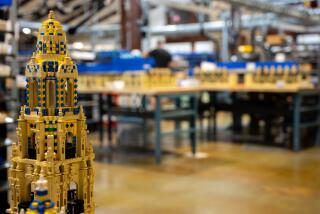Childhood Is Tougher Than It Used to Be
- Share via
Try as I might, I cannot remember at what age I began to read and write. I’ve no recollection of feeling a flush of satisfaction at admiring my name as I laboriously finished printing it in crude, uneven letters. I think my mind was set in other directions.
What’s more, my memory is blank about these early and primitive maiden attempts at writing by my own children. I’ve only the vaguest recollection of my children proudly bringing home crayon or finger-painted pictures on which they had put their first names.
I’ve clearer memories of mysterious, lumpy clay objects modeled by them that they explained were certain animals. I know I’ve received such creatures as both birthday and Christmas gifts, and, because they amused me and I didn’t wish to hurt my offspring’s feelings, I kept them around for a while on my dresser.
I distinctly remember one clay creation by daughter Susan. It was a crude bust of a bald man, with a large nose and flaring nostrils, colored an atrocious pink. I had asked her who it represented, and she had replied guilelessly that it was “Mr. Picknose.”
I cherished Mr. Picknose for many years because I was so deeply amused by it, and, for a less important reason, because of its remarkable resemblance to primitive sculptures. Obviously, it was something I could relate to, but more about that attitude in a moment.
Susan is grown now and has two children of her own, the eldest of whom answers to the nickname of Buff. Of all the combined children and grandchildren of my wife and I, Buff is the only one interested seriously in my hobby of theatrical magic.
It was a gift from me of a beginner’s magic book that recently brought me my first written letter from Buff, who is 6. Buff wrote in full, in large, uneven printing in pencil, these words: “Dear Grandpa Thank you for the cub scout book. how are you doing. Love Buff.”
At first I was astonished at having such a literate grandchild at age six, then I thought of one of my wife’s grandchildren, Anna, who at age 4, last month hand-printed a letter informing us that she was teaching herself to read and write and ride a bicycle.
So far, neither my wife nor I have received gifts of clay from any of the grandchildren. Messages, crayon drawings and even short letters written on computers, with designs printed out, have been our gifts. It seems clay modeling has gone out of fashion. Literate offerings are the “in” thing.
I am humbled and awed by these letters, especially Ana’s. I am positive that these children are more precocious and vastly more motivated toward academic matters than I ever was at a comparable age.
I’ve another recollection of my lying on a mat at grammar school--I think it was in the first grade--during those rest periods to which the teachers subjected their young students, and memorizing the alphabet printed on a strip hung on the wall. Some other children knew the alphabet, and I was stimulated by envy of their advanced learning to do something about it for myself. That is how retarded I was, a form of retardation that I suspect was not uncommon 60 years ago among my contemporaries. I think I didn’t learn to read with any degree of understanding until at least the second or third grade.
Today’s children, I suggest, are literate at earlier ages than we oldsters as children ever were. Looking back, I believe my generation’s chief advantage over today’s children lay in our capacity to amuse ourselves by making our own playthings and play times.
If we wanted a toy boat, we made it ourselves, crude as it was, of wood and paper; if we wished a radio of our own, we made it by winding coils and putting together crystal sets. While some of our parents were preoccupied with making illegal homemade beer during Prohibition, we learned to use their crocks and bottlers to make our own root beer, some bottles of which merrily exploded in the cellars along with our parents’ brew.
I suggest we were better players and doers. We had no television to turn us into spectators. But I could be wrong about that. Those were simpler times in which to grow up. I can imagine how I would have responded if I had been faced with learning how to run a computer at the early age that today’s children learn it. I’d probably have done what I did when faced with piano lessons: run off to the Los Angeles River bottom to catch crawdads with my pals.
I know that, as a boy, I’d rather have sent my grandparents a handmade, clay pin tray, a Mr. Picknose and, perhaps, a bottle of root beer than to have written them letters. That would have strained my intellect and patience beyond toleration.
More to Read
Sign up for our Book Club newsletter
Get the latest news, events and more from the Los Angeles Times Book Club, and help us get L.A. reading and talking.
You may occasionally receive promotional content from the Los Angeles Times.










